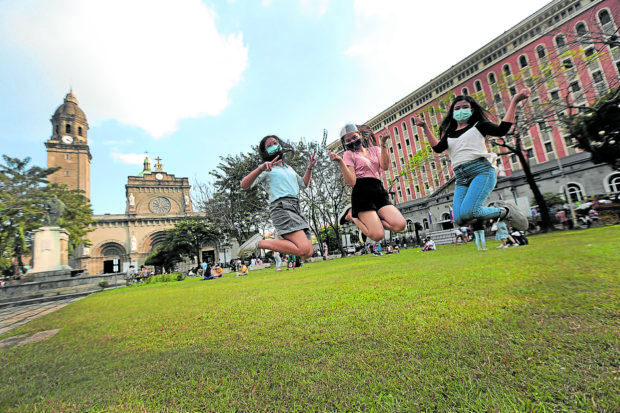
BACK FOR A STROLL Visitors spend a leisurely morning on Saturday outside Manila Cathedral, one of the tourist attractions where restrictions on public gatherings have been relaxed. —GRIG C. MONTEGRANDE
MANILA, Philippines — As the country marks one year of quarantine restrictions in March, Metro Manila and nine other areas will remain under general community quarantine (GCQ) amid the continuing threat of the coronavirus pandemic and a spike in new reported cases.
The government, however, relaxed the rules for domestic travelers. Instead of being mandatory, it’s now up to individual local governments if they still want to require COVID-19 testing and a 14-day isolation period for incoming travelers.
Malacañang on Saturday said President Rodrigo Duterte had decided to keep the capital region, the provinces of Apayao, Kalinga, Mountain Province, Batangas and Lanao del Sur, along with Baguio City, Davao City, Iligan City and Tacloban City, under GCQ up to March 31.
The rest of the country will remain under the least restrictive modified general community quarantine (MGCQ).
The technical advisory council of the Department of Health (DOH) in Manila earlier recommended that Cebu be placed under the most stringent ECQ, or enhanced community quarantine, citing the recent rise in local cases and the detection of the UK variant of the coronavirus in the province. But the DOH Central Visayas office was able to convince the council to reconsider its decision.
‘Good decision’
The government’s economic managers earlier supported moves to finally place the entire country under modified general community quarantine (MGCQ), stressing the need to reopen more businesses and revive the economy.
At Saturday’s Laging Handa briefing, OCTA research fellow and University of the Philippines professor Guido David said that “it’s a good decision that Metro Manila has not yet eased into MGCQ.”
David cited the “upward trend” in cases in the capital region, warning that it could be a “sustained event.”
The DOH on Saturday reported 2,921 new COVID-19 cases—the highest daily count since the 3,139 reported on Oct. 16, 2020. The figure was also higher than OCTA’s projection that Metro Manila’s daily tally could reach 2,500 new cases by the end of March if restrictions are further eased.
Travel restrictions eased
“It’s a genuine increase and the rate of increase, the trajectory is similar to what we saw in Cebu, Mountain Province and Benguet. This is actually very concerning,” David said.
Also on Saturday, the Inter-Agency Task Force for the Management of Emerging Infectious Diseases (IATF) approved uniform travel protocols that dispensed with coronavirus testing and quarantine for travelers.
Reservations
“Travelers shall no longer be required to undergo COVID-19 testing except if the LGU (local government unit) of destination will make testing as a requirement prior to travel,” presidential spokesperson Harry Roque said.
Swab testing is the only approved mode for local governments, Roque added.
The IATF also eased documentary requirements for travelers. “The travel authority issued by the Joint Task Force COVID Shield and health certificates shall no longer be required,” Roque said.
OCTA’s David, however, expressed reservations over the decision to ease travel requirements.
“We have to be careful about our border controls,’’ he said. “We sometimes have a second wave or another increase because we are not as strict as border controls. I hope they would evaluate the measures.” “There are areas that are OK, like Bacolod and Iloilo, but we don’t want to add to their cases. At least if it’s just certain areas, we can focus our efforts there,” he added.